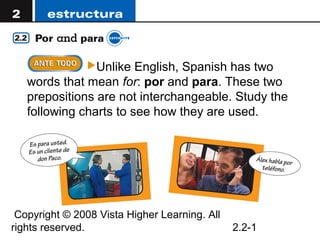
Porvs para
- 1. Unlike English, Spanish has two words that mean for: por and para. These two prepositions are not interchangeable. Study the following charts to see how they are used. Copyright © 2008 Vista Higher Learning. All rights reserved. 2.2-1
- 2. Copyright © 2008 Vista Higher Learning. All rights reserved. 2.2-2
- 3. Copyright © 2008 Vista Higher Learning. All rights reserved. 2.2-3
- 4. ¡Atención! Por is also used in several idiomatic expressions, including: por aquí around here por ejemplo for example por eso that’s why; therefore por fin finally Copyright © 2008 Vista Higher Learning. All rights reserved. 2.2-4
- 5. Copyright © 2008 Vista Higher Learning. All rights reserved. 2.2-5
- 6. In many cases it is grammatically correct to use either por or para in a sentence. The meaning of the sentence is different, however, depending on which preposition is used. Copyright © 2008 Vista Higher Learning. All rights reserved. 2.2-6
- 7. Completa estas oraciones con las preposiciones por o para. 1. por Fuimos al cibercafé _____ la tarde. 9. El reproductor de MP3 es _____ 2. Necesitas un módem _____ navegar usted. en la red. 10. Juan está enfermo. Tengo que 3. Entraron _____ la puerta. trabajar _____ él. 4. Quiero un pasaje _____ Buenos 11. Estuvimos en Canadá _____ dos Aires. meses. 5. _____ arrancar el carro, necesito la 12. _____ mí, el español es fácil. llave. 13. Tengo que estudiar la lección 6. Arreglé el televisor _____ mi amigo. _____ el lunes. 7. Estuvieron nerviosos _____ el 14. Voy a ir _____ la carretera. examen. 15. Compré dulces _____ mi novia. 8. ¿No hay una gasolinera _____ 16. Compramos el auto _____ un aquí? buen precio. Copyright © 2008 Vista Higher Learning. All rights reserved. 2.2-7